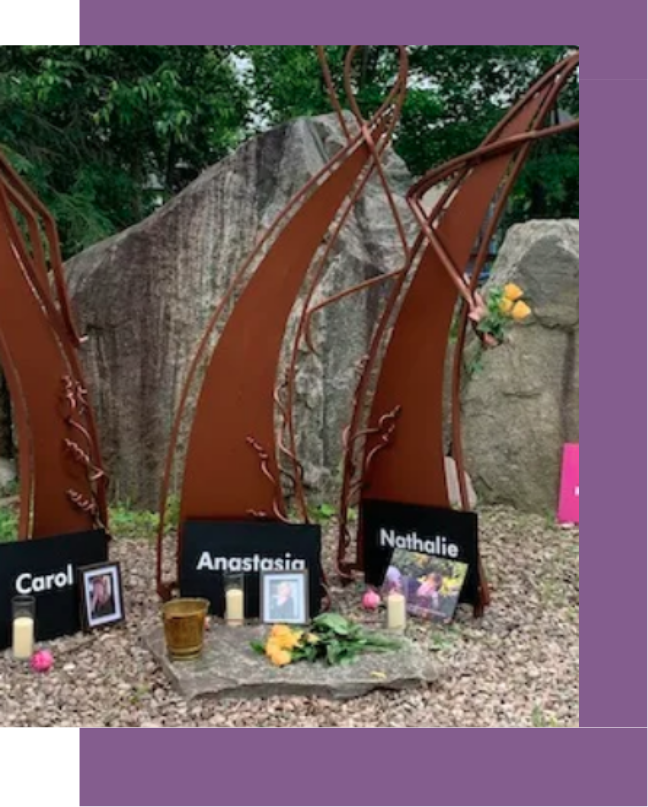CKW Inquest Anniversary
This month marks three years since the conclusion of the inquest into the tragic femicides of Carol Culleton, Anastasia Kuzyk, and Nathalie Warmerdam. In the wake of this violence, the 2022 inquest resulted in 86 urgent recommendations aimed at preventing intimate partner violence (IPV) and femicide across Ontario. As we mark the third anniversary of the CKW Inquest, we reflect on some of the progress made and the work still left outstanding.
Progress Towards Implementation
One notable step forward has been the widespread recognition of IPV as an epidemic. Nearly 100 municipalities across Ontario have declared intimate partner violence an epidemic, responding to the first recommendation from the CKW inquest. These declarations are an important signal that local governments are beginning to treat IPV as the public health and safety crisis that it is.
Additionally, in response to another inquest recommendation, the Information and Privacy Commissioner of Ontario developed a comprehensive informational handout for service providers about how Ontario’s privacy laws apply in situations of IPV. This resource supports service providers in making informed decisions about when and how information can be shared without consent to prioritize safety and public interest. The handout includes clear infographics, case examples, and legal guidance and is a vital tool for navigating the complex intersection of privacy and safety.
You can access the handout here: https://www.ipc.on.ca/en/IPVguidance
Necessary Next Steps
Despite some progress towards implanting the jury’s recommendations, many still remain outstanding, including the recommendation for the province of Ontario to formally declare IPV an epidemic. Also among the outstanding recommendations is a call for a comprehensive, independent, and evidence-based review of Ontario’s mandatory charging framework in IPV cases.
This policy, introduced over 40 years ago, mandates police to identify the primary aggressor and lay charges where they believe there is a reasonable likelihood of conviction. While intended to increase survivor safety and perpetrator accountability, it has removed survivor autonomy and resulted in survivors being charged, particularly those from marginalized communities. We see the impact of mandatory charging on survivors in family court when it comes to complicating family court proceedings and severely disadvantaging survivors who have been criminalized as a result of these policies. Luke’s Place has advocated for a review of mandatory charging in our discussion paper here.
Despite the jury’s recommendation, the provincial government has only “accepted in part” this call for a review. The Ministry of the Solicitor General has indicated no current plans to commission an independent review, opting instead for internal reviews as part of future regulatory development.
However, there is new momentum for reform. Bill 55, Intimate Partner Violence Epidemic Act, 2025, currently before the Ontario Legislature, would formally declare intimate partner violence an epidemic and establish a Renfrew County Inquest Implementation Committee. This committee will determine how to implement the 86 recommendations and monitor and report on the government’s progress each year. This would not only fulfill the first recommendation from the jury but would also establish accountability mechanisms as also called for in the recommendations.
Education for legal system professionals was another one of the recommendations from the Inquest and has been a key recommendation by the Domestic Violence Death Review Committee in past death reviews. In terms of education for judges, progress has been made with the passing of Kiera’s Law which added IPV to the list of possible topics for judicial education in the governing legislation. However, this education is optional, and we continue to push for meaningful implementation and accountability.
Ongoing Advocacy
To support ongoing advocacy to implement the remaining recommendations, Luke’s Place created an Advocacy toolkit that provides practical strategies, messaging guidance, and tools for organizations and individuals working to push for implementation. It is a vital resource in the broader movement for justice and safety.
On the third anniversary of the Inquest, we remember Carol Culleton, Anastasia Kuzyk, and Nathalie Warmerdam, and we renew our commitment to advocating for systemic changes that prioritize survivor safety and autonomy. We call on the provincial government to fully implement the outstanding recommendations, pass Bill 55, and engage in ongoing and meaningful consultations with all survivors and their advocates when it comes to addressing IPV in Ontario.


